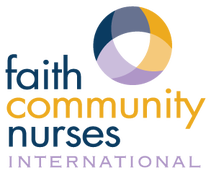Becoming a Faith Community Nurse |
If you are interested in delivering wholistic health care with promotion of whole-person care across the life span using professional nursing skills and providing spiritual care (ANA, 2016), then consider becoming a Faith Community Nurse (FCN)!
The definition of a Faith Community Nurse according to the Faith Community Nursing Scope and Standards of Practice is:
"...a specialized practice of professional nursing that focuses on the intentional care of the spirit as well as the promotion of whole-person health and the prevention or minimization of illness withing the context of a faith community and the wider community " (ANA & HMA, 2017, p. 1)
The currently preferred minimum preparation for entry to Faith Community Nursing is:
- Baccalaureate or higher degree in nursing including a focus in community or population care
- Current experience as an RN using the nursing process
- Knowledge of the community's healthcare assets and resources
- Specialized knowledge of the faith community spiritual beliefs and practices
- Specialized knowledge and skills to enable implementation of the most recent Faith Community Nursing Scope and Standards of Practice (currently the 3rd edition). (ANA & HMA, 2017, p. 25)
The Scope and Standards (2017) identifies Faith Community Nursing is unique, having various educational programs for entry, including accredited continuing education programs, baccalaureate or graduate nursing courses, or "related content in counseling, public health, and pastoral care" (ANA & HMA, 2017, p. 28). The original continuing education program was developed in 1996 and continues to be revised and offered as the Foundations Faith Community Nursing Curriculum. Although the "Foundations" is one of the main ways of obtaining the "specialized knowledge and skills" for faith community nursing, there are other means of becoming a FCN, including college/university courses and continuing education, as well as faith-based programs.
The Westberg Institute offers a calendar on their website listing some of the Foundations courses and continuing education available. The Westberg Institute offers a wealth of information and resources, including an annual Westberg Symposium for FCNs; Perspectives: A newsletter for Faith Community Nurses, and the FCN Knowledge Sharing Platform on Yammer. FCNI has a group on this FCNI Knowledge Sharing Platform/Yammer host site.
Catholic Faith Community Nursing education includes the resource Improving the Lives of Older Adults through Faith Community Nursing Partnerships
The United Methodist Church has New Certifications in Parish Nursing Now Available for Ordained and Lay Leaders.
Reverend Dr. Granger E. Westberg, the Department of Preventive Medicine and Community Health of the University of Illinois College of Medicine, and the W. K. Kellogg Foundation developed Wholistic Health Centers in 1973 to promote whole-person health and wellness within faith-based settings. The nurses were referred to as Parish Nurses. The Parish Nurse Resource Center was developed in 1986 with the assistance of Lutheran General Hospital (now Advocate Health Care) in Park Ridge, IL (northern Chicago area). The name was changed to the International Parish Nurse Resource Center in 2001 due to expansion of the programs. The Deaconess Foundation moved the IPNRC to St. Louis, MO and managed the program beginning in 2002. In 2011 the IPNRC was relocated to the Church Health Center in Memphis, TN, where the foundation's name changed to the Westberg Institute for Faith Community Nursing in 2016 to acknowledge the work of Reverend Dr. Granger Westberg. (ANA & HMA, 2017)
The Health Ministries Association (HMA) was created in 1989 at a meeting prior to the annual Parish Nurse Resource Center annual conference with goals to assist in the planning and development of health ministries and faith community nursing within communities of faith. HMA and the ANA collaborated to develop and revise the Faith Community Nursing Scope and Standards of Practice, and to pursue initial certification (which is no longer available). HMA offers an annual meeting and conference, as well as resources.
Faith Community Nurses International (FCNI) was developed in 2013 as the international professional membership organization for Faith Community Nurses. FCNI's goals include the provision of education and practice resources, as well as promoting the research impacting FCN practice. The International Journal of Faith Community Nursing is available as the official online journal hosted by Western Kentucky University.
Evangelical Lutheran Parish Nurse Association (ELPNA) is affiliated with the Evangelical Lutheran Church in America and serves Parish Nurses/Faith Community Nurses of the Lutheran faith within 9 regions across the US. Grants are available for starting a Parish Nurse/Faith Community Nurse program.
American Nurses Association. (2016). Higher education: Learning what it means to provide spiritual care. The American Nurse. Retrieved from http://www.theamericannurse.org/2016/11/01/higher-education/ (link is broken)
American Nurses Association & Health Ministries Association, Inc. (2017). Faith community nursing: Scope and standards of practice, (3rd ed.). Silver Spring, MD, Nursebooks.org.
Catholic Health Association of the United States. (2016). Improving the lives of older adults through faith community partnerships: Healing body, mind and spirit. Author. Retrieved from https://www.chausa.org/docs/default-source/eldercare/improving-the-lives-of-older-adults-through-faith-community-partnerships_final-oct-192016.pdf?sfvrsn=0
Schroepfer, E. (2016). A renewed look at faith community nursing. MEDSURG, 25(1), 62-66. Retrieved from www.chausa.org/docs/default-source/nursing/a-renewed-look-at-faith-community-nursing.pdf?sfvrsn=0
